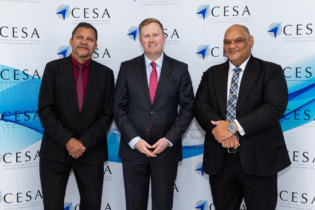 Times remain tough for the consulting engineering industry, a recent study by the Consulting Engineers South Africa (CESA) has found.
Times remain tough for the consulting engineering industry, a recent study by the Consulting Engineers South Africa (CESA) has found.
CESA’s bi-annual economic and capacity survey for the period January to June 2016 found that confidence levels amongst firms and fee increases have deteriorated in recent years.
“The outlook for gross fixed investment has deteriorated and expected to fall behind GDP growth in the next three years,” CESA said.
Over 537 firms employing just over 24 315 staff, who collectively earn a total fee income of R25 billion per annum, are members of CESA.
Factors influencing global outlook
There are three key factors that influence the global outlook:
- The gradual slowdown and rebalancing of the Chinese economy
- Lower prices for energy and other commodities
- The gradual tightening of the United States’ monetary policy.
The South African economy faced several headwinds in 2016, some of which were expected, while others were not.
“Global factors play a much bigger role than may be suggested, with the sluggish global economy offering little relief in the demand for South African goods and services which has waned considerably over the last two to three years,” CESA said.
“Contractors have for some time reported on the slow pace by which contracts are awarded, as well as the slow roll out of government projects.
CESA added that this created a “disconnect between opinions expressed by engineers and contractors, where projects are in planning stages, supporting earnings in the consulting engineering industry, but implementation is slow.”
FACTS AND FIGURES
Transformation has seen progress in the industry
The appointment of Black executive staff (including Black, Asian and Coloured staff) increased to 40.8% from 39,5% and 38,0% in the previous two surveys.
The appointment of Black executive staff steadily increased from 28,1% in the June 2012 survey. “This shows real significant progress in terms of industry transformation,” CESA said. “There has also been a steady improvement in the appointment of women at an executive level.
Business confidence remains low
CESA indicated that confidence in the consulting engineering sector “generally lags business sentiment”.
“Business confidence is currently at 42 as at the 3rd quarter of 2016,” CESA said. “This continues to depict negative market sentiment which does not bode well for private sector fixed investment.”
CESA added that business confidence was negatively impacted by poor economic growth, threatened by a looming recession, increase in political instability, and tightening of monetary policy alongside a sharper than expected increase in inflation.
Gross fixed capital formation is deteriorating
The report found that growth in gross fixed capital formation lagged GDP growth in 2014, and contracted by 0.3% on average for the year, compared to a 1.5% increase in economic growth. Investment in fixed capital formation showed a mild recovery in 2015, up 1.4% on average, supported by a 6% increase in investment by general government. Investment growth from SOEs and the private sector remained muted, increasing by 0.8% and 0.4% respectively.
Fee earnings remain muted
Fee earnings in the first six months of 2016 fell marginally by 0.2% compared to the last six months of 2015, following the increase of 6% in the previous period, the report found. Larger firms reported a stronger decline of 5.3%, while medium and smaller size firms improved earnings by 15.1% and 10.6% respectively.
The contribution to fee earnings by the private sector improved slightly to 41% (from 40.3% in the December 2015 survey), but is largely on par with the average over the last 2-year and 5-year period.
CESA said that the public sector remained the most important client to the industry, but due to the decrease in central government (down from 5.9% in December 2015 to 4% in the current survey), the contribution by the public sector moderated to 58% from 60%.
Payment is a serious issue
CESA said payment remained a serious issue, which resulted in a broad based effect on firms operating in the industry. After reflecting some improvement in the December 2015 survey, the percentage of fees outstanding for longer than 90 days as a percentage of total estimated income (including late payments) deteriorated to an average of 25% from 23% and 24.5% in the previous two surveys. At 25%, this is the highest recorded level since 1999.
Industry confidence levels are well below average
Confidence levels among firms have deteriorated over the last few years, alongside modest increases in fee earnings, CESA said. In the December 2015 survey, confidence levels fell to its lowest level in 16 years, significantly weaker in the last six months of 2015, compared to expectations in the June 2015 survey. Since then, CESA said there has been some improvement with the net satisfaction rate improving to 75% in the first six months of 2016 (from 39.4% in the December 2015 survey), with similar levels projected for the next 12 months. Levels remained well below average for the past five years, and are recovering from historically low levels, surpassed only by the 1998/99 recession caused by the Asian financial crisis.
Procurement remains the biggest challenge
Regulation issues, including the procurement of consulting engineering services, remain one of the biggest challenges faced by the industry. Unrealistic tendering fees are a concern for members, while the extended time it takes in which to finalise a proposal is affecting profitability in the industry, CESA said. The quality of technical personnel is said to have deteriorated putting greater risk on the built environment sector. Skills shortages have also been regarded as one the most significant institutional challenges faced by the private and the public sector.
“The involvement of non-CESA members in government tenders and procurement continues to threaten the standard and performance of the industry,” CESA said. “Firms from across South African borders are tendering at rates that are not competitive for local firms.”
Unlocking greater private sector participation is seen as a critical element to fast track delivery which will support engineering fees and as such engineering development in the industry. Many of the projects highlighted in the NDP can be carried out by the private sector through public-private partnerships.
Service delivery, especially at municipal level remains a critical burning issue. Lack of attention to maintain infrastructure poses a serious problem for the industry with infrastructure being left to deteriorate to such a state, that maintenance becomes almost impossible.
“Fraud and corruption was also affecting the ethos of our society, with a lot of talk and little action accompanying the growing evidence of corruption,” CESA said. “CESA is aware that members are under pressure from contractors and corrupt officials, to certify payment for work not completed. This is regarded as an extremely serious matter for CESA and as such will be relentless in holding those in power accountable.”
Quality Management System (QMS)
All CESA member firms are required to have a QMS as a condition of CESA membership. The majority of firms (97%) said it had a QMS system in place. While larger firms have the QMS in place, 93% of micro enterprises that responded to the survey have also complied. This figure was up from 88% in the December 2015 survey.
 Times remain tough for the consulting engineering industry, a recent study by the Consulting Engineers South Africa (CESA) has found.
Times remain tough for the consulting engineering industry, a recent study by the Consulting Engineers South Africa (CESA) has found.





